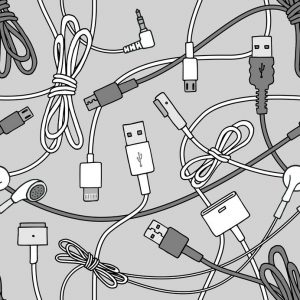At least when it comes to electrical systems of buildings, the old cables must be handled by an electrician, who will first decommission the old installation by disconnecting it from the electrical panel. It is well known that old electric cables cannot be used anymore, so the electrician will remove them from the walls if possible (there are cases where the wires are simply buried in concrete without being protected by anything else). Since a new electrical installation uses materials differently and the number of electrical circuits is higher, new cable routes will be required.

As for other types of cables, such as telecommunication and television cables, these are necessary for using certain appliances. If you no longer use the appliance, you typically no longer need the cable. It is unlikely that you can use these cables for other purposes, so it is best to recycle them. Look at https://iec.net/ for additional information on cable management.
Recycling is an important resource for the recovery of conductive metals from cables, especially copper and aluminum. Also, the plastic mixtures obtained by recycling the cables are thermally processed in order to recover the energy used to produce them.
Nowadays, there are highly efficient modular systems for recycling various types of cables, with superior results, low processing costs and low energy consumption.





